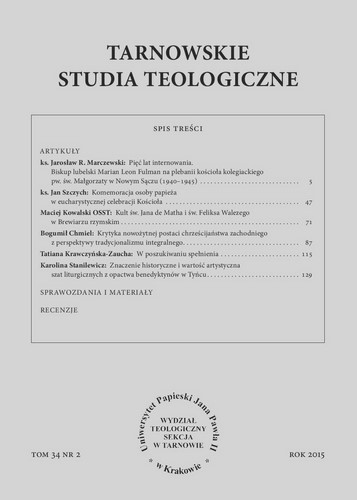Criticism of modern forms of Christianity from the integral traditionalist’s point of view
DOI:
https://doi.org/10.15633/tst.1641Keywords:
traditionalism, humanism, perennial philosophyAbstract
The purpouse of this paper is to examine main objection against modern form of western christianity formulated by representatives of Traditionalist School (R. Guénon, F. Schuon, A. K. Coomaraswamy). According to traditionalist’s point of view degeneration of contemporary culture was caused by metaphysical shift toward humanism, indyvidualism and anthropocentrism, which began XIV century and gradually destroyed whole hierarchical and theocentrical culture. In case of religion this revolution led to sentimentalism, moralism, and religious syncretism. These attitudes realised by Reformation spoiled not only modern theology but whole religious world view.References
Coomaraswamy A. K., Who is „Satan” and where is „Hell”, [w:] The essential Ananda K. Coomaraswamy, ed. R. P. Coomaraswamy, Bloomington 2004, s. 23–34.
Coomaraswamy, 2: Selected papers. Metaphysic, ed. R. Lipsey, Princeton 1977.
Coomaraswamy R. P., Ancient beliefs or modern superstitions: the search for authenticity, [w:] The betrayal of tradition. Essays on the spiritual crisis of modernity, ed. H. Oldmeadow, Bloomington 2005, s. 55–73.
Eliade M., Sacrum, mit, historia, przeł. A. Tatarkiewicz, Warszawa 1974.
Na antypodach modernizmu. Pisma wybrane, red. M. Rostkowski, Biała Podlaska 2014.
Goodrick-Clark N., The western esoteric tradition. A historical introduction, Oxford 2008.
Guénon R., The crisis of the modern world, trans. M. Pallis, A. Osborne, R. C. Nicholson, Hillsdale 2001.
Guénon R., A material civilization, [w:] The betrayal of tradition. Essays on the spiritual crisis of modernity, ed. H. Oldmeadow, Bloomington 2005, s. 18–27.
Guénon R., Not fusion but mutual understanding, [w:] Crossing religious frontiers, ed. H. Oldmeadow, Bloomington 2010, s. 18–27 (Studies in Comparative Religion).
Guénon R., The great triad, trans. P. Kinsley, Cambridge 1991.
Jagadguru Sri Chandrasekharendra Saraswati Swamigal, On religion, [w:] Crossing religious frontiers, ed. H. Oldmeadow, Bloomington 2010, s. 28–33 (Studies in Comparative Religion).
Mikołaj z Kuzy, On peaceful unity of faith (De pace fidei), [w:] J. Hopkins, Nicolas of Cusa’s De pace fidei and Cribatio Alkorani: translation and analysis, Minneapolis 2004, s. 633–676.
Pico della Mirandola, Mowa o godności człowieka, [w:] Wybrane teksy z historii filozofii. Filozofia włoskiego odrodzenia, przeł. A. Nowicki, Warszawa 1967, s. 137–147.
Schuon F., Religio perennis, [w:] Crossing religious frontiers, ed. H. Oldmeadow, Bloomington 2010, s. 13–17 (Studies in Comparative Religion).
Schuon F., No activity without truth, [w:] The betrayal of tradition. Essays on the spiritual crisis of modernity, ed. H. Oldmeadow, Bloomington 2005, s. 3–14.
Schuon F., The transcendent unity of religions, Wheaton 2005.
The essential René Guénon. Metaphysic, tradition and the crisis of modernity, ed. J. Herlihy, Bloomington 2009.
Downloads
Published
Issue
Section
License
Copyright (c) 2016 Bogumił Chmiel

This work is licensed under a Creative Commons Attribution 4.0 International License.
Authors who publish with this journal agree to the following terms:
- Authors retain the copyright and full publishing rights without restrictions, and grant the journal right of first publication with the work simultaneously licensed under a Creative Commons Attribution 4.0 International License that allows others to share the work with an acknowledgement of the work's authorship and initial publication in this journal.
- Authors are able to enter into separate, additional contractual arrangements for the non-exclusive distribution of the journal's published version of the work (e.g., post it to an institutional repository or publish it in a book), with an acknowledgement of its initial publication in this journal.
- Authors are permitted and encouraged to post their work online (e.g., in institutional repositories or on their website) prior to and during the submission process, as it can lead to productive exchanges, as well as earlier and greater citation of published work (See The Effect of Open Access).

